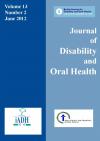Journal of Disability and Oral Health

- Cover Date:
- June 2012
- Print ISSN:
- 1470-855
- Vol:
- 13
- Issue:
- 2
Access to dental care for persons with disabilities in Saudi Arabia (Caregivers’ perspective)
Doi: 10.4483/JDOH_006AL-shehri11
Abstract Aim:To determine if persons with disabilities encounter difficulties in accessing dental care and to identify barriers to dental care for such individuals in Saudi Arabia from the perspective of their caregivers. Study population and methods: The data for the study were obtained through a self-administered questionnaire distributed to 250 caregivers. Of these, 119 questionnaires were returned, giving a response rate of 47.6%. Results: 84.7% of persons with disabilities saw a dentist only for an emergency, and 46.2% reported having difficulty in obtaining dental care in their community. Oral hygiene practices of those with disabilities, the frequency of visits to the dentist for check-ups, as well as the likelihood of having had contact with a dentist during the preceding year were significantly influenced by the caregivers’ level of education. However, the frequency of tooth brushing as well as the method of cleaning the teeth of those with disabilities were not influenced by the caregivers’ level of education. Fear of the dentist (52.1%), cost (48.7%), being unable to sit in the dental chair (28.2%), transportation difficulties (26.9%), distance to the dental clinic (18.5%), and the dentist’s unwillingness to treat those with disabilities (16.8%) were all barriers to dental care for individuals with disabilities. Conclusion: Half of the caregivers of those with disabilities reported that they had difficulty accessing dental care, and 85% of persons with disability saw the dentist for emergency treatment only. Fear of dentists
Key words: Access to dental care, disability, care givers’ perspective, barriers, level of education
Introduction
Disability is a condition or function judged to be significantly impaired relative to the usual standard of an individual or group. The term is used to refer to individual functioning, including physical impairment, sensory impairment, cognitive impairment, intellectual impairment, mental illness, and various types of chronic diseases (http:// www.disabled-world.com/disability/types/ ) According to the World Health Organisation estimates, individuals with disabilities comprise 10% of the population in developed countries and 12% of that in developing countries (Ceyhan et al., 2010). Saudi Arabia has undergone rapid economic development in recent decades, which has been reflected in improved health care services and a decrease in child mortality, such that children with disabilities have been more likely to survive (Shawky et al., 2002). However, there are no sufficient and accurate
data on the prevalence of disabilities in Saudi Arabia. Studies on the subject have been performed in the Kingdom as investigations of single types of childhood disability, but most of these were unpublished or did not use a uniform definition (Shawky et al., 2002). A recent national survey on disability in Saudi Arabia reported the prevalence of major disabilities as affecting around 4% of the population (Al-Turaiki, 2000). Despite the growing awareness in the public and among health professionals about the importance of oral health as an integral part of total health and function, oral health care for this growing segment of our population has received scant attention. Severity of medical conditions and perceived general health are significantly correlated with dental functional status and severity of dental disease (Sheiham, 2005; Bhambal et al., 2011). For persons with disabilities, the effect of dental disease on general health and function appears greater than for similar groups with-
- Article Price
- £15.00
- Institution Article Price
- £
- Page Start
- 51
- Page End
- 61
- Authors
- Sharifa A M AL-Shehri
Articles from this issue
- Title
- Pg. Start
- Pg. End
- The oral health experiences of children with learning disabilities in special schools in Sheffield
- 45
- 50
- Access to dental care for persons with disabilities in Saudi Arabia (Caregivers’ perspective)
- 51
- 61
- Evaluation of a mechanical stretching device, the TheraBite®, in patients with restricted maximal mouth opening and neuromuscular disorders: a case series
- 71
- 75
